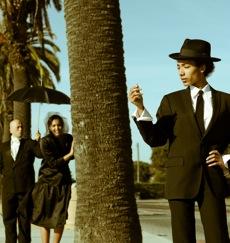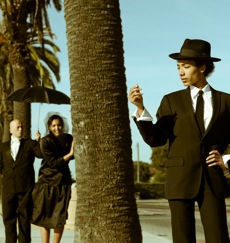The musical and theatrical foods of love are both being well-served by the African-American Shakespeare Company’s resetting of Twelfth Night, continuing through this month.
Directed by longtime California Shakespeare Theater actor L. Peter Callender, the production transplants the Elizabethan comedy of frustrated love to 1940s San Francisco, with a soulful score by Marcus Shelby, an award-winning jazz bassist, bandleader, educator, and composer. The result is an impressive double confirmation: that jazz in a style from seven decades ago can stay fresh and appealing, and that the twists, turns, and titillations penned by a quill four centuries ago can still summon rapt attention and laughter.
Twelfth Night is said to be the most musical of Shakespeare’s plays, with at least four songs and several allusions to music embedded in the script. After being commissioned by the Company a year ago, Shelby kept in close company with cast and crew to inform his composition. In the process, he came to respect and adopt Callender’s reverence for the time-honored text.
“We had text classes, we had language classes, and I went to them all,” Shelby relates. He notes that only two or three of the mostly black cast of 15 had previous experience with Shakespeare. "And Peter called in other people to do workshops on the philosophy and the history, so even those who’d never done Shakespeare got a good education.”
Shelby admits about the The Bard’s exposition that, “I don’t understand it word-for-word when I read it, it takes me several reads. For the context and the jokes, sometimes I have to sit down and write all of it down, and draw arrows. But when I finally get there, it’s so fulfilling.”
In keeping with his admiration, “I was very conscious about not getting in the way of the text, or writing music that could drown it,” Shelby says, borrowing a metaphor from one of the play’s plot points. “You have to be careful to make sure the text is still breathing. The English is already a challenge, straight-up, so you don’t want to complicate matters by trying to over-orchestrate.” He enlisted Classical Revolution violinist Jory Fankuchen and players from his Marcus Shelby Orchestra to record “cues,” in solo or small ensemble settings that enhance but don’t intrude on selected scenes when they’re played over the theater’s sound system.
“The first theme I came out with was Olivia’s Theme, heard throughout the play, the love theme, which also accompanies the first song you hear, after Orsino comes out with, ‘If music be the food of love, play on,’” says Shelby. He based this theme on his previous experience of the actress, Rebecca Frank. Most of the rest of the score is character-driven, “because that determines the arc of the melody, the coloring of the harmonies, and the essence of whatever rhythm may be employed.”
Shelby cites the example of the song Come Away, Come Away Death, assigned by Shakespeare to the clown Feste, but sung to Duke Orsino in this production by Viola, who’s in love with the Duke but has been forced to disguise herself as a young male, Caesario.
“Renée [Wilson, who plays Viola/Caesario] is a really good singer, and I’d been talking with her about her influences. So this melody, which I call Come Away Blues, is the kind of song you might hear Bessie Smith or Billie Holiday sing, and it fits with what Renée can do vocally, her range and intonation.” It also resonates nicely with the disguised young woman’s awkward dialogue with her beloved.
The numbers vocalized by Feste, O Mistress Mine and the ending When That I Was and a Little Tiny Boy, are in a rough-hewn ballad style well-suited to the unaffected baritone of the wry, wise fool, wonderfully realized by veteran actor Charles Branklyn. Feste also joins the comic characters Sir Toby Belch (J. “Darryl” Williams) and Sir Andrew Aguecheek (Martin Grizzell) for Three Merry Men Be We, which Shelby describes as “kind of a church shout.”
The historical as well as the ethnic setting of this production demanded from Shelby “a sound that the era was associated with, a lot of it in the harmony and melody, but also in the instrumentation and how the instruments were altered, with cup mutes, plunger mutes, Harmon mutes, and sometimes straight mutes. Duke Ellington was the master of this: how they evoke the human voice, the cries, the wails, and the laughter.”
What Ellington and Shakespeare have bequeathed to the present generation has lost none of its humanity or its majesty. “And I would never, ever advocate changing the language,” Shelby insists. “It’s still very potent, very alive, and necessary to be heard.”


